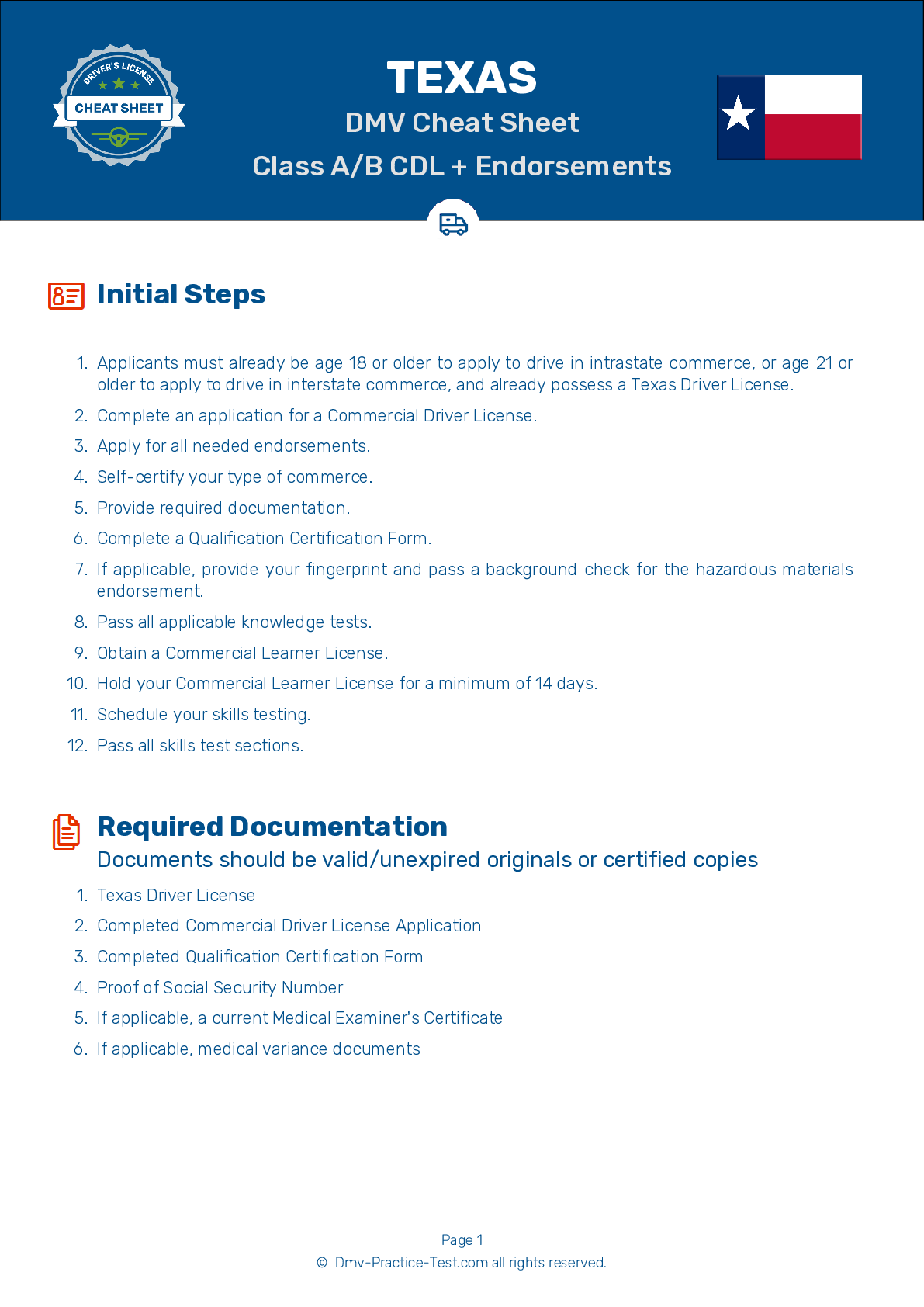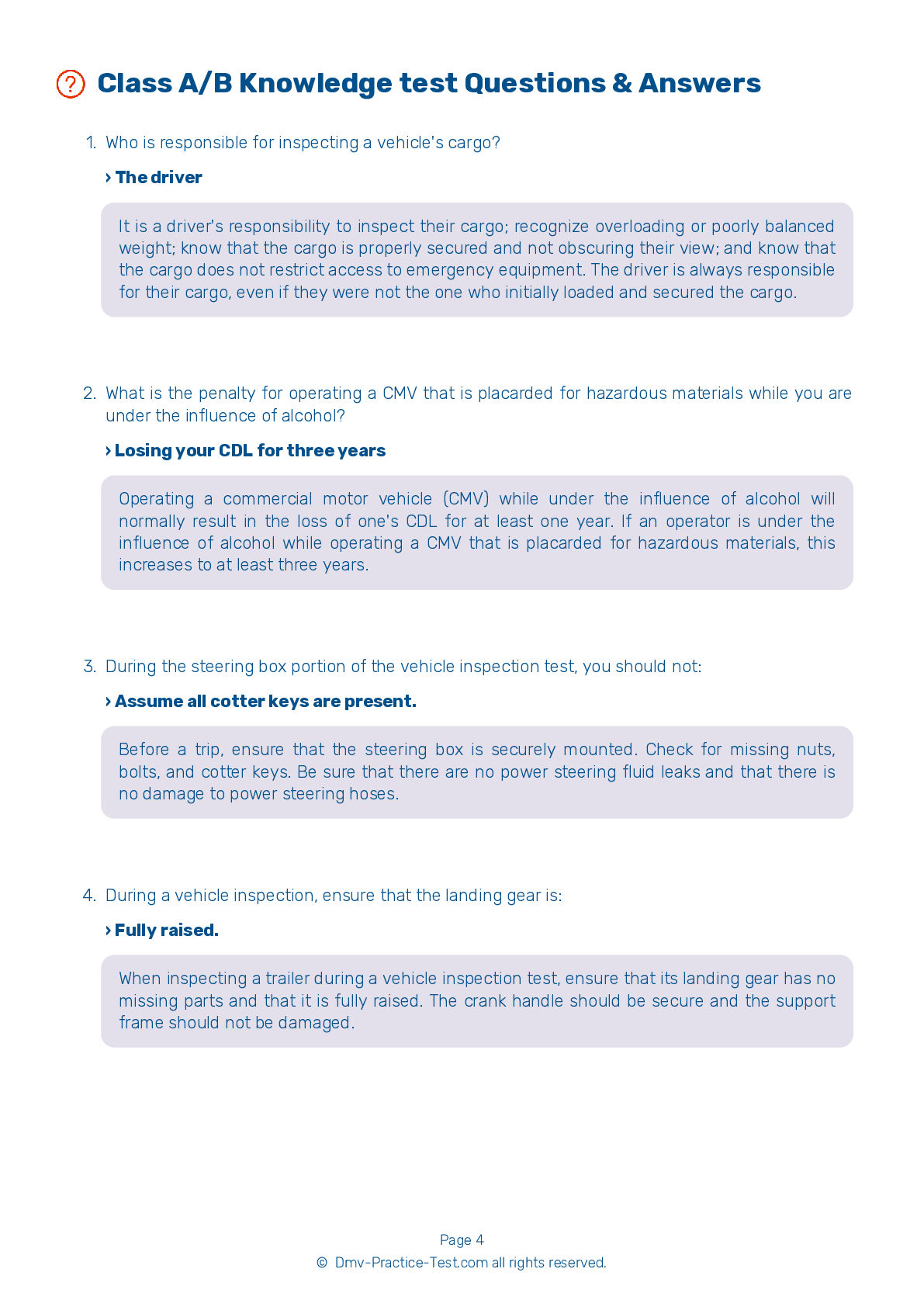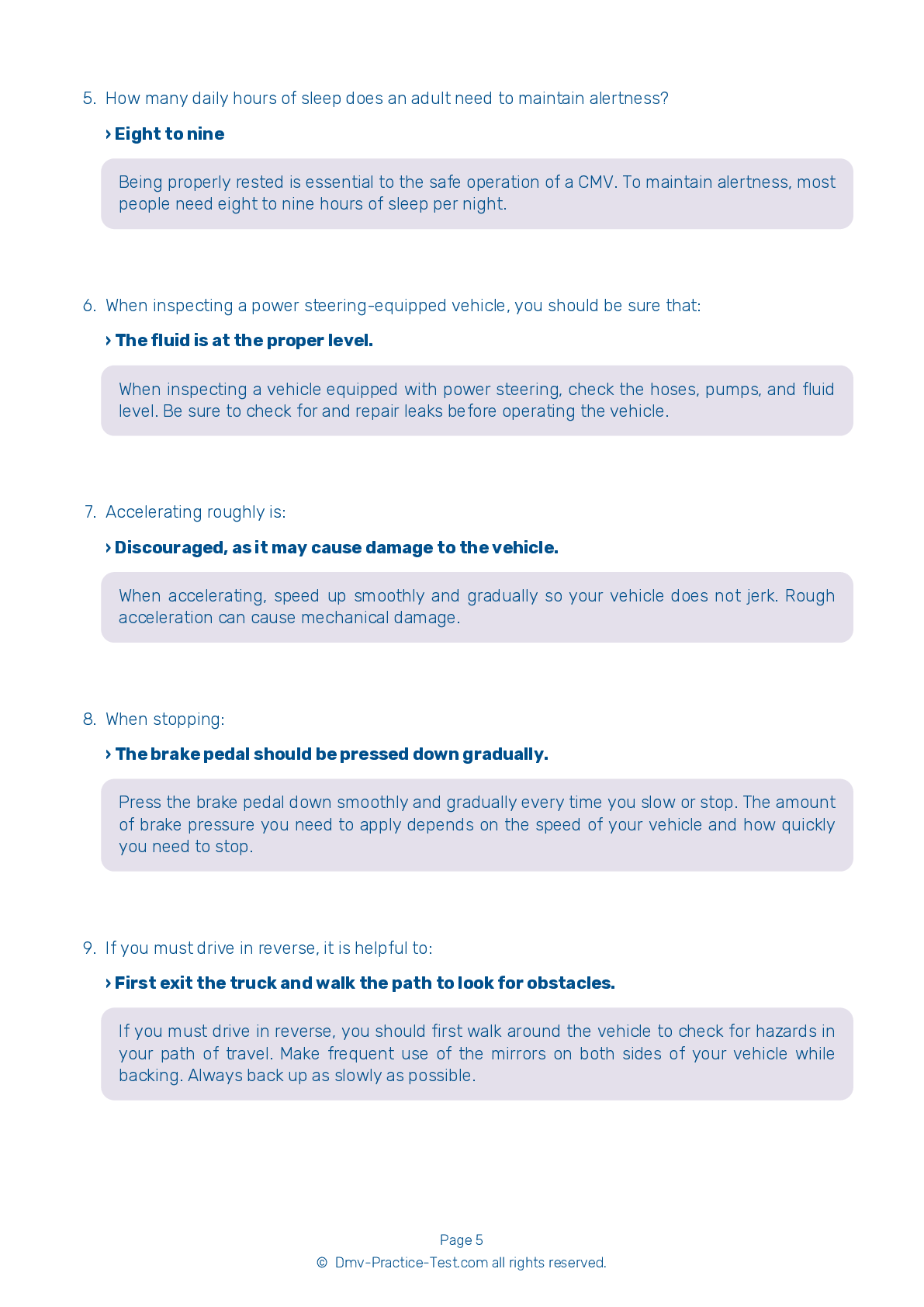Knowledge Test Class B #2
Class B Driving Test | Texas 2026 #2 Page 2 of 7
Train for FREE online with our Texas class B license test. The official exam test consists of several obligatory parts, with all of them checking your knowledge of different blocks of road rules. If you need to obtain a TX CDL class B permit in 2026, practice as much as possible. Free sample tests published on our website will help you check and improve your knowledge and boost your grades. Please bear in mind that CDL class B requirements may vary from state to state.
50
40
22
8 . Improperly loaded cargo can:
Aid in safety.
Cargo must be properly loaded and secured to prevent it from falling or shifting dangerously. During a quick stop, improperly loaded cargo could injure or even kill the driver.
9 . After starting the engine, oil pressure should reach a normal level:
Within 10 minutes of driving.
After you start the engine, keep an eye on the gauges. Oil pressure should rise to a normal level within a few seconds of the engine being started.
10 . The parking brake should be:
Removed.
The parking brake in a vehicle with air brakes should be used every time the vehicle is parked.
11 . When conducting a vehicle inspection, you will need to identify all of the following, except:
The water compressor belt.
During the vehicle inspection test, you must check the power steering belt, water pump belt, alternator belt, and air compressor belt for snugness, cracks, or frays. If any of these components are not belt-driven, you must tell the examiner which one(s), and verify that they are operating properly, mounted securely, and not damaged or leaking.
12 . The air pressure in a dual air brake system should build from 85 to 100 psi within:
45 seconds.
When inspecting a vehicle with a dual air brake system, you should wait for air pressure to build from 85 to 100 psi in both the primary and secondary systems. This should take about 45 seconds.
13 . Which of the following is an example of a serious traffic violation?
Traveling in a group of more than five CMVs
Serious traffic violations include excessive speeding (15 mph or more above the posted limit); reckless driving; improper or erratic lane changes; following a vehicle too closely; traffic offenses committed in a CMV in connection with fatal traffic accidents; driving a CMV without obtaining a CDL or having a CDL in the your possession; and driving a CMV without the proper CDL class and/or endorsements.
14 . If another driver is following you too closely, you should do all of the following, except:
Avoid relying on tricks to help others pass.
If you are being followed too closely, you should increase your following distance, avoid making quick moves, and avoid relying on tricks (such as flashing your lights) to help other drivers pass. Speeding up may only increase the danger by causing the tailgater to continue tailgating you at a higher speed.
2026 Texas | Frequently Asked Questions
To acquire a CDL Hazmat endorsement in Texas, you must first have a Commercial Driver's License (CDL). Then, pass the Hazardous Materials Endorsement Knowledge Test at a Texas Department of Public Safety office. After passing, you'll need to undergo a TSA background check. Once cleared, the endorsement will be added to your CDL.
To obtain a CDL Hazmat license, you must first hold a valid Commercial Driver's License (CDL). You must be at least 21 years old and have a clean driving record. You'll also need to pass the Hazardous Materials Endorsement Knowledge Test and undergo a TSA background check. Good vision and physical health are also prerequisites.
When applying for a CDL Hazmat endorsement, you will need your current CDL, proof of U.S. citizenship or legal status (like a birth certificate or green card), and proof of identity and Texas residency. You'll also need your Social Security card and a completed Application for Texas Driver License or Identification Card. Lastly, you'll need to pass a TSA background check.
Yes, there is a dedicated written test for the CDL Hazmat endorsement. Called the Hazardous Materials Endorsement Knowledge Test, it covers topics like loading and unloading hazardous materials, bulk packaging marking, driving and parking rules, and emergency response procedures. This test must be passed to obtain the Hazmat endorsement.
The written test for the CDL Hazmat endorsement covers a range of subjects related to hazardous materials. These include recognizing hazardous materials, safe loading and unloading procedures, proper use of placards and labels, emergency response procedures, driving and parking rules for hazardous materials, and understanding the associated risks and regulations.
Yes, acquiring a CDL Hazmat endorsement comes with additional charges. These include a fingerprinting fee for the required TSA background check, and an endorsement fee. The exact costs can vary, so it's recommended to check with your local Department of Motor Vehicles (DMV) or similar agency for the most accurate information.
Yes, obtaining a CDL Hazmat endorsement requires a background check and security clearance. The Transportation Security Administration (TSA) conducts the check, which includes fingerprinting and a review of criminal, immigration, and terrorism records. This process is necessary to ensure the safety and security of hazardous materials transportation.
Yes, specialized training is required for the CDL Hazmat endorsement. Applicants must pass a written test, and in some cases, a driving test with a vehicle that carries hazardous materials. Once passed, this endorsement is added to your Commercial Driver's License (CDL). Regular renewal of this certification is also required.
No, you cannot legally transport hazardous materials without a valid Commercial Driver's License (CDL) with a Hazardous Materials (Hazmat) endorsement in the United States. This requirement ensures that drivers have the necessary training and knowledge to handle such materials safely, protecting public safety and the environment.
Yes, you can add the CDL Hazmat endorsement to your current CDL. You don't need to apply for a new CDL. However, you must pass the Hazmat knowledge test, undergo a TSA background check, and pay the required fees. Once completed, the endorsement will be added to your existing CDL.



